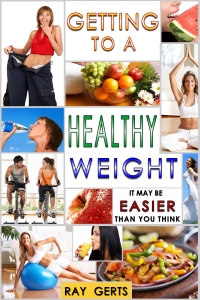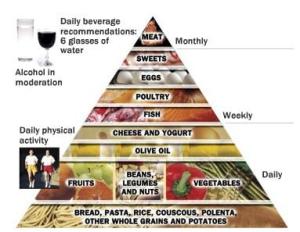Ways to Make Your Diet Work Better
Reach short-term weight loss goals for long-term wellness
Have you started a new diet plan? Maybe you're struggling with a weight loss program that seems to be dragging. Whether you've set short-term weight loss goals or committed to long-term wellness, there are ways to make your diet work better. And the good news is that it takes just 20 minutes of your time.
How to Make Weight Loss Happen
Research into weight loss has revealed that goal setting is one of the most important steps in the weight loss process.
Why? Because setting short-term diet goals provides a road map for long-term health and wellness.
For example, your long-term goal might be to lose 50 pounds. Losing that amount of weight might improve your health and change the quality of your life. That's exciting! But if you lose weight at a reasonable pace, it might take 6 months to a year to reach your goal. It's hard to stay motivated for that long.
But if you set short-term weight loss goals along the way, you'll have reasons to celebrate during the journey. These small accomplishments help to keep you motivated and remind you that you are capable of reaching the finish line.
So how do you set both long- and short-term weight loss goals? Dieters who take the time to set a SMART goal are more likely to slim down. If you're not sure how to set a weight loss goal or set up your diet plan, use this list based on recent research to set up a program that works.
5 Steps to Make Your Diet Work Better
- Personalize your weight loss goals. The goals you set should meet your specific needs, lifestyle, and circumstances. Don't get carried away with the exaggerated ads for popular diet programs that are unlikely to work. For most people, those programs are not healthy or realistic.
Losing a maximum of 1-2 pounds per week through diet and exercise is considered reasonable. But you may choose to set a more personalized goal. Researchers at the University of Washington found that sometimes dieters don't like the strict standards set by many weight loss plans.
So choose a plan and make adjustments based on your lifestyle and preferences. Before you invest any time or money ask yourself key questions about what you hope to achieve. In the long run, making this extra investment will help you to stay on track and tackle common weight loss challenges as they arise.
- Get expert help. Goals set with the help of an expert are more likely to be successful. A study at the University of California found that when patients were provided with help setting up and monitoring goals in the doctor's office they were more successful at attaining those goals. And similar studies have shown that other types of practitioners can help as well.
In choosing an expert to work with, try to find someone who can be involved for the duration of the weight loss process. This way they can help to monitor your progress and provide feedback. For this reason, a physician may not always be the best source for collaboration. Consider other non-clinical providers. These may include a personal trainer, registered dietitian or weight loss coach. If you don't have access to a professional expert, consider connecting with others online. - Make weight loss goals measurable. In their advice to new exercisers, the American Council on Exercise recommends setting measurable goals. That means that when you set up your diet plan, you decide how you will measure your progress and include this as part of your goal statement.
Weighing yourself on the scale is probably the easiest method of measuring weight loss progress as long as you weigh yourself properly. But remember that there are other ways to assess your weight. Both BMI and body fat measurements provide different ways of evaluating your body composition. BMI is easy to measure and provides a good indicator of how your weight affects your health.
- Write and post short and long term goals. In a published study about goal setting, researchers in Great Britain confirmed that successful goals need to be ambitious. On the other hand, the American Council on Exercise reminds new exercisers that successful weight loss goals should be attainable. So how do you set a goal that seems do-able and challenging at the same time?
The answer is to write out both long-term goals that are more difficult and short-term goals that are a little easier. The short-term goals act as stepping-stones to the larger goal. In the Great Britain study, researchers emphasized using "incremental steps that lead to progressive achievement" as being important. By defining these multiple weight loss goals, you'll set yourself up for success. Once the goals are written out, post them in a place where you see them every day to serve as a reminder of your commitment.
- Create deadlines for your weight loss goals. Goals are more successful when a clear deadline is attached. These deadlines should be attached to both the short-term and long-term goals and can serve as reminders to measure your progress in the process of achieving your goal.
For many people, a seven-day structure works well for short-term goals. This provides for a fresh start each week on Sunday or Monday. But remember to personalize your goals and use a time frame that works for you.
Goal setting may seem like a trivial task but it can be a key factor in the success of your diet plan. As you move through the weight loss process, the well-designed goals will help you to stay on track. And once you've lost the weight, good goal setting skills come in handy during the weight management process. At that stage, you'll find that continuing to set and reach goals will keep your confidence high.
I have to add a couple of comments. I'm not in favor of putting a timeline on your goal. Everyone will lose weight differently, depending on your age and percentage of body fat. You do have to change your diet to lose weight but you can't starve yourself. You have to eat and exercise to lose body fat. Sometimes you'll need some professional help. Weight Loss Counselors have the experience but get a recommendation. There are no licensing requirements for counselors.
If you really want to lose your body fat than look for my e-books at the websites listed below. You'll get information on Healthy eating, exercise, and diet. Instead of spending hours on the internet reading dozens of posts, you can save time by picking up one of my e-books.
There are two e-books. “How Bad Do You Want To Lose Weight?” is available at all the online bookstores selling for $1.99. Go to any of the websites below and search the title to find my e-book. This book gives you all you need to lose weight without spending money on gym memberships, diet plans or meal plans. Look for my book. at Amazon.com, B&N.com, iBooks, Kobo.com, Scribd.com, or Gardner Books in the U.K.
My new e-book is available on Smashwords.com, just type “getting to a Healthy Weight” in the search box at the top of the home page.




/about/low-fat-vs-low-carb_Medium_663558-573e2d6f5f9b58723d8dbdde.jpg)



